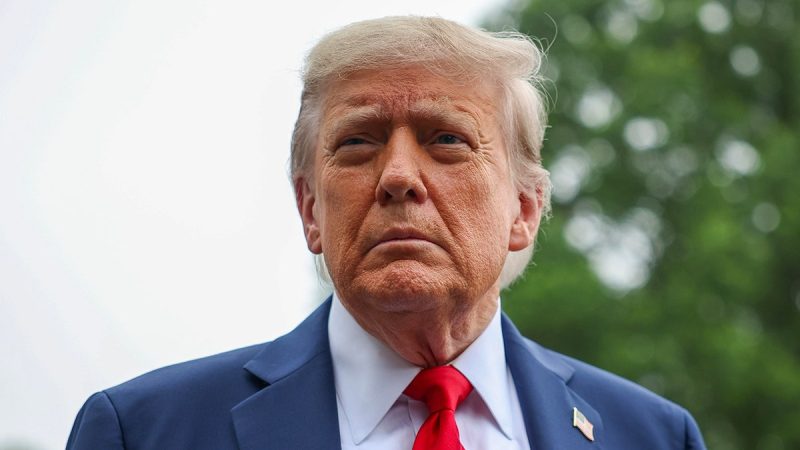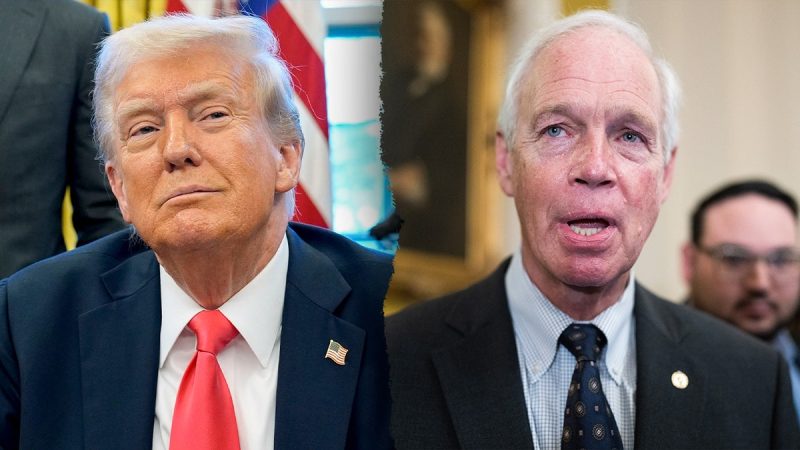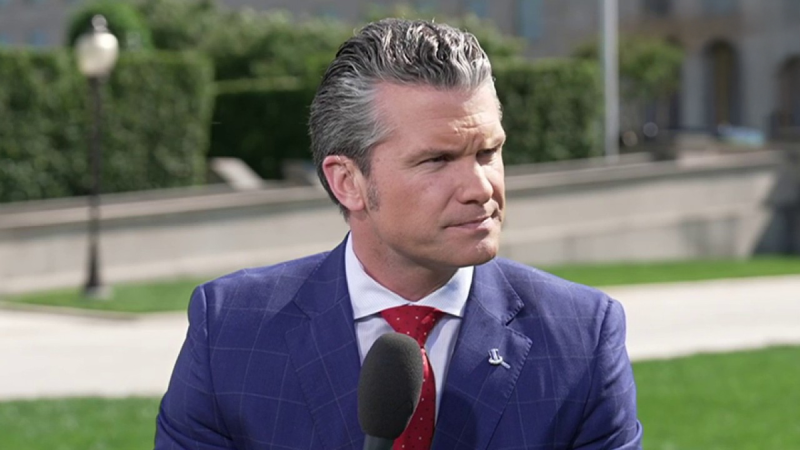A trio of key Trump administration officials — Secretary of Defense Pete Hegseth, Director of National Intelligence Tulsi Gabbard and White House press secretary Karoline Leavitt — are in the midst of facing their first majorforeign policy test in their high-profile admin roles after Israel launched preemptive strikes on Iran and President Donald Trump weighs involving the U.S. in the conflict.
The trio ascended to their roles with widespread fanfare among many MAGA conservatives, though many critics just months ago questioned if their prior careers prepared them for what was to come. The current flaring tensions with the Islamic Republic could be the final arbiter of which side was correct.
‘President Trump leads from the front, and he has assembled a highly-qualified, world-class team that has helped him achieve numerous foreign policy accomplishments this term,’ White House spokeswoman Anna Kelly told Fox Digital on Wednesday when asked about the trio’s test on Iran. ‘The American people trust the President to make the right decisions that keep them safe, and he has empowered his team to meet the moment and advance his foreign policy goals.’
Defense Secretary Pete Hegseth
Secretary Hegseth was one of Trump’s more controversial nominees among critics, as Democrat lawmakers and left-wing pundits slammed Hegseth as unqualified for the job.
‘This hearing now seems to be a hearing about whether or not women are qualified to serve in combat. And not about whether or not you are qualified to be secretary of defense,’ Illinois Democrat Sen. Tammy Duckworth said during Hegseth’s confirmation hearing before the Senate Armed Services Committee in January. ‘And let me just say that the American people need a secretary of defense who’s ready to lead on day one. You are not that person.’
‘Is Pete Hegseth truly the best we have to offer?’ asked Democrat Sen. Jack Reed of Rhode Island, ranking member of the committee.
Hegseth battled against claims he would lower previous standards for the secretary of Defense and that his vows to strengthen the military could be bluster once he was in the role and juggling oversight of the entire military.
‘As I’ve said to many of you in our private meetings, when President Trump chose me for this position, the primary charge he gave me was to bring the warrior culture back to the Department of Defense,’ he said in his opening statement during his confirmation hearing. ‘He, like me, wants a Pentagon laser focused on warfighting, lethality, meritocracy, standards, and readiness. That’s it. That is my job.’
Hegseth was confirmed to the role after Vice President JD Vance issued a tie-breaking vote when Republican Sens. Lisa Murkowski, Susan Collins and Mitch McConnell joined Democrats in voting against the confirmation.
Hegseth is an Ivy League graduate and former National Guard officer who was deployed to Iraq, Afghanistan and Guantanamo Bay during his military career, which began in 2003. He is also the recipient of a handful of military awards, including two Bronze Stars. He appeared before the Senate Armed Services Committee on Wednesday and was pressed about the Israel–Iran conflict.
‘They should have made a deal,’ Hegseth said.
‘President Trump’s word means something — the world understands that,’ Hegseth said, referring to Trump’s repeated pressure on Iran to make a deal with the U.S. on its nuclear program as the conflict spiraled.
‘And at the Defense Department, our job is to stand ready and prepared with options. And that’s precisely what we’re doing,’ Hegseth continued.
He did not reveal if the U.S. would assist Israel in the ongoing strikes on Iran, but that the Pentagon is in the midst of preparing options for Trump.
Any potential U.S. involvement in the strikes could pull the country into war against Iran.
‘I may do it, I may not do it,’ Trump said Wednesday on whether he would order a strike on Iran. ‘I mean, nobody knows what I’m going to do.’
Hegseth was among high-profile Trump officials who joined Trump in the White House’s Situation Room as the president and his team closely monitor the flaring conflict.
Director of National Intelligence Tulsi Gabbard
Director of National Intelligence Gabbard is another Trump official who faced an intense confirmation hearing as critics argued she was unqualified for the role.
Gabbard is a former Democrat who served in the U.S. House representing Hawaii from 2013 to 2021, a former member of the House Armed Services Committee and an Iraq war veteran. However, she had never held a formal position within the intelligence community before serving as director of national intelligence.
Ahead of her confirmation, Gabbard’s critics slammed her as lacking the qualifications for the role, questioning her judgment over a 2017 meeting with then-Syrian dictator Bashar Assad, labeling her as sympathetic toward Russia, and balking at her previous favorable remarks related to former National Security Agency whistleblower Edward Snowden.
‘Those who oppose my nomination imply that I am loyal to something or someone other than God, my own conscience and the Constitution of the United States,’ she said during her confirmation hearing. ‘Accusing me of being Trump’s puppet, Putin’s puppet, Assad’s puppet, a guru’s puppet, Modi’s puppet, not recognizing the absurdity of simultaneously being the puppet of five different puppet masters.’
She ultimately was confirmed in a 52–48 vote.
Gabbard’s March testimony before the Senate dismissing concerns Iran was actively building a nuclear weapon is back under the nation’s microscope after Israel launched preemptive strikes on Iran. Israel’s strikes were in direct response to Israeli intelligence showing Iran could produce a nuclear weapon in a short span of time.
Trump was asked about Gabbard’s testimony while traveling back to Washington Monday evening from the G7 summit in Canada, and the president said he did not ‘care’ what Gabbard had to say in previous testimony, arguing he believes Iran is close to building a nuke.
‘You’ve always said that you don’t believe Iran should be able to have a nuclear weapon,’ a reporter asked Trump while aboard Air Force One on Monday. ‘But how close do you personally think that they were to getting one?’
‘Very close,’ Trump responded.
‘Because Tulsi Gabbard testified in March that the intelligence community said Iran wasn’t building a nuclear weapon,’ the reporter continued.
Trump shot back, ‘I don’t care what she said. I think they were very close to having one.’
When Gabbard appeared before the Senate Intelligence Committee in March, she delivered a statement on behalf of the intelligence community that included testimony that Iran was not actively building a nuclear weapon.
‘Iran’s cyber operations and capabilities also present a serious threat to U.S. networks and data,’ Gabbard told the committee on March 26.
The intelligence community ‘continues to assess that Iran is not building a nuclear weapon, and Supreme Leader Khamenei has not authorized the nuclear weapons program that he suspended in 2003,’ she said. She did add that ‘Iran’s enriched uranium stockpile is at its highest levels and is unprecedented for a state without nuclear weapons.’
‘Iran will likely continue efforts to counter Israel and press for U.S. military withdrawal from the region by aiding, arming and helping to reconstitute its loose consortium of like-minded terrorist actors, which it refers to as its axis of resistance,’ she warned.
However, as critics picked apart Gabbard’s past comments, the White House stressed that Gabbard and Trump are closely aligned on Iran.
A White House official told Fox News Digital Tuesday afternoon that Trump and Gabbard are closely aligned and that the distinction being raised between Gabbard’s March testimony and Trump’s remarks that Iran is ‘very close’ to getting a nuclear weapon is one without a difference.
The official noted that Gabbard underscored in her March testimony that Iran had the resources to potentially build a nuclear weapon. Her testimony in March reflected intelligence she received that Iran was not building a weapon at the time but that the country could do so based on the resources it amassed for such an endeavor.
Press Secretary Karoline Leavitt
Leavitt is the youngest press secretary in U.S. history, assuming the role at age 27.
Some liberal critics, such as Joy Behar of ‘The View,’ attempted to discount her appointment when she was first tapped by Trump, and she has since emerged as a Trump administration firebrand during her routine White House press briefings.
Though Leavitt has overwhelmingly been praised by supporters of the president for her defense of the administration and repeated fiery exchanges with left-wing media outlets during briefings, her tenure has overwhelmingly focused on domestic issues.
Leavitt has kept the nation updated on issues such as mass deportation efforts, Trump’s ongoing list of executive orders affecting policies from transgender issues to electric vehicles, national tragedies such as the terror attack in Boulder targeting Jewish Americans and Trump’s wide-ranging tariff policy that affects foreign nations.
Though the administration entered office with a war raging between Russia and Ukraine, as well as the ongoing war in Israel after Hamas attacked the country in 2023, the Israel–Iran conflict provides Leavitt with her first major international crisis that could include U.S. involvement.
Leavitt’s highly anticipated first press briefing since Israel launched its preemptive strikes is scheduled for Thursday.
This post appeared first on FOX NEWS










